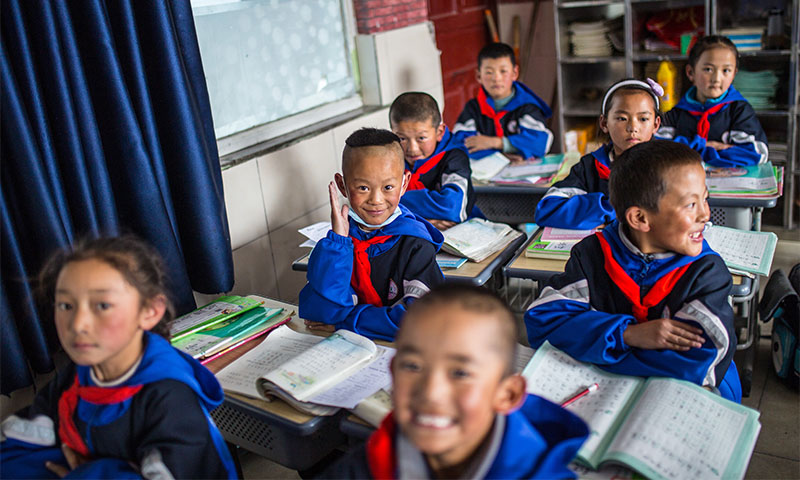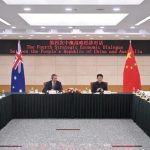
Diverse, humane, and vibrant boarding schools provide children with quality education, safe environment: senior official of Xizang

Boarding schools have elevated the accessibility of education, meeting the people's demand for quality educational resources to the greatest extent and offering an excellent environment for children, especially those in remote areas, to learn and grow, a senior official from Southwest China's Xizang Autonomous Region said on Friday.
Boarding education in China is fundamentally different from the colonial-style boarding schools selectively established in some Western countries in the last century. The allegations that Tibetan children in Xizang are being "forced" to attend boarding schools are a malicious smear with ulterior motives, Xu Zhitao, vice chairman of Xizang Autonomous Region, said on Friday at a press conference.
"We all know that some areas in Xizang have high altitudes, harsh natural conditions, and extremely dispersed populations. Particularly for children in farming and pastoral areas, attending school is very inconvenient, and dispersed schooling cannot ensure quality education. Therefore, there is a special need for schools that combine boarding and day schooling to ensure that children have the right to education and equal access to high-quality educational resources," he said.
He mentioned that boarding and day schools have been established in every province of China, serving all school-aged children. Boarding education has become a main form of schooling in rural and pastoral areas. This is a natural choice in the practice of running schools locally, in line with China's basic national conditions and the geographical realities and educational needs of people in pastoral areas.
"China's boarding education is diverse, humane, and vibrant. It is a good way of developing the educational business and improving the level of education available to all, fully reflecting the public welfare nature of education," he noted.
According to the Compulsory Education Law of China, county-level governments set up boarding schools as needed to ensure scattered school-age children and teenagers receive compulsory education.
In Xizang Autonomous Region, boarding schools implement a "three guarantees" policy of providing food, accommodation, and covering study expenses.
Global Times reporters have visited boarding schools in Lhasa, Shannan, Nagqu, Nyingchi and other places in Xizang in recent years and found that students of all ethnicities in Xizang are guaranteed education and life quality. Tibetan students can speak fluent Putonghua and Tibetan and confidently discuss their dreams with reporters.
The principal of Shannan No.2 Senior High School, Nie Xin, told the Global Times recently that learning Putonghua and Tibetan is equally important in their school. Learning Putonghua is for better and higher quality development opportunities.
"Our Tibetan language classes are taught in Tibetan, and we also offer courses in Tibetan calligraphy, traditional Tibetan painting, Tibetan opera, traditional Tibetan musical instruments, and Tibetan dance," he said. "We always welcome friends from the media, including Western media, to come and see for themselves, clarify misunderstandings, and restore the truth."
Mimi, a senior student from Sog County, Nagqu, who sought better educational opportunities in Shannan, said, "My home is over 700 kilometers away from the school. It is impossible for me to commute 1,400 kilometers every day. Staying at school saves a lot of time and travel expenses, eases the burden on my family, and allows me to learn more and participate in clubs of interest."
Migmar Drolma, a parent of a senior high school boy, shared with the reporters that locals have always placed a high value on education, and neighbors are eager to send their children to good schools for a solid foundation. "Having my child go to school, I believe, will shape his excellent character and contribute to his all-around development."
Pema Tso, an expert from the Xizang Academy of Social Sciences, who also attended boarding schools as a student, said that many of the misunderstandings about Xizang are narratives constructed by the Western media with political motives.
Nowadays, a modern education system encompassing preschools, primary and secondary schools, vocational and technical schools, institutions of higher learning, and continuing and special education institutions is in place, read the State Council's newly-released white paper, CPC Policies on the Governance of Xizang in the New Era: Approach and Achievements.
From 2012 to 2022, the central government invested more than 251.51 billion yuan ($34.5 billion) in Xizang's education. At present, the region has 3,409 schools of various types and at various levels, hosting over 944,000 students. The gross enrolment rate for preschool education has reached 89.52 percent. The completion rate for compulsory education has reached 97.73 percent.
The gross enrolment rate in senior high schools is 91.07 percent. The results of the seventh national census showed that the number of college or university graduates per 100,000 inhabitants in Xizang had risen from 5,507 in 2010 to 11,019 in 2020. New entries into the region's workforce now have an average of 13.1 years of education.



